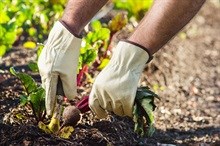Woolworths is pioneering a new method of farming that sets out to help the farmers grow quality produce while protecting the environment‚ preserving natural resources and reducing dependence on synthetic fertilisers‚ herbicides and pesticides - all without adding anything to the price that the consumer pays.

© jillchen - Fotolia.com
Between 88% and 92% of the Cape Town-based chain's fresh produce is grown locally‚ and its policy is to import only when it cannot obtain produce in SA.
According to the company‚ the problem with conventional farming methods is that they strip minerals and nutrients from the soil‚ so that over time‚ more and more fertilisers are needed‚ and even with these expensive additional inputs‚ the yield of crops drops‚ requiring more to produce less.
Soil health is key
The key to the success of Woolworths' Farming for the Future initiative is soil health. When soil is healthy‚ it requires less irrigation because it is better able to retain water‚ and soil erosion is reduced. Healthy soil also requires fewer chemical interventions‚ so there is less chemical run-off into water systems‚ and fewer chemicals and pesticides are used.
Woolworths technologist Kobus Pienaar says the sustainable farming initiative will help ensure SA can grow sufficient produce in the future.
"We are much more involved in farming than any of the other retailers‚ and we believe we are much more advanced‚" he says.
"To address sustainability is the right thing to do. It's one of our values. But as a business‚ we cannot be sustainable if our suppliers are not sustainable; where are we going to get the product from?" Pienaar said.
Trial results
Initial trials of the farming initiative show yields and quality are more consistent and land‚ water‚ insecticide‚ pesticide and fertiliser use reduced. Pienaar was speaking on a media tour of Greenpak farms in the Bothaville area of the Free State.
Greenpak‚ which applies farming for the future methods‚ has seen substantial water savings‚ while simultaneously increasing the amount of carrots delivered to Woolworths during the past 14 months. Greenpak's Woolworths business consists of a processing facility and 600ha of irrigation lands for growing carrots‚ butternuts and pumpkins. Along with about 50-70 tonnes of carrots a week‚ it also supplies other carrot products like Parisienne‚ Julienne and Chef's Style with baby carrots.
"The truck leaves the pack house every night and travels to the Woolworths distribution centre in Midrand where the product then gets moved‚" Pienaar says.
Water management
Because SA is a water-scarce country‚ and the quality of water is threatened‚ in part by industrial and agricultural activity‚ Greenpak farms apply stringent water-management measures.
These measures include electronic measurement of water use in its pack house‚ the use of carrot shakers to remove access soil before washing‚ and a waste filtration system that recycles water for irrigation use.
During the past three years‚ Woolworths has saved 720.9-million cubic metres of water. That is about double the capacity of the Grootdraai Dam‚ near Standerton.
Suppliers
Including horticulture‚ Woolworths has about 150 direct suppliers‚ most of them situated in the Western Cape‚ Limpopo and KwaZulu-Natal. "The majority of our suppliers have a long-term relationship with the group; they've been with us for 15‚ 25‚ 30 years‚ so it's important that we keep the family sustainable. In Woolworths we have different teams that look after vegetables‚ salad‚ horticulture and fruit‚ and in every team there are technologists whose job is not only to ensure food safety but also be involved in innovation‚" Pienaar says.
These teams travel overseas researching trends‚ often with the retailer's suppliers.
"In May we're going to have a trip specifically on energy saving for in-house growing‚ and our top five growers will go with us.
"We will have a tour via France‚ The Netherlands and Belgium because they have the best techniques and equipment available there‚ and we're going to do a case study and out of that implement across our suppliers what is applicable‚" he adds.
Expansion
Woolworths aims to expand its Farming for the Future programme to its dairy and beef suppliers by 2015. In September‚ the group's leadership in corporate sustainability in the retail industry was recognised by the Dow Jones Sustainability indices for the third consecutive year.
Woolworths was one of only five South African companies - and the only retailer - to be included in the sustainability world index. The others are: Exxaro‚ Gold Fields‚ Nedbank and Sasol.
Woolworths' Good Business Journey is a comprehensive plan to make a difference in key areas of sustainability: energy‚ water‚ waste‚ farming‚ fishing‚ transformation and social development.
According to the group's chairman‚ Simon Susman‚ contrary to the common belief that sustainability is a "cost that eases conscience"‚ Woolworths continues to deliver financial results that show strong growth‚ lower costs and real improvements to communities and the environment in which it operated.




































